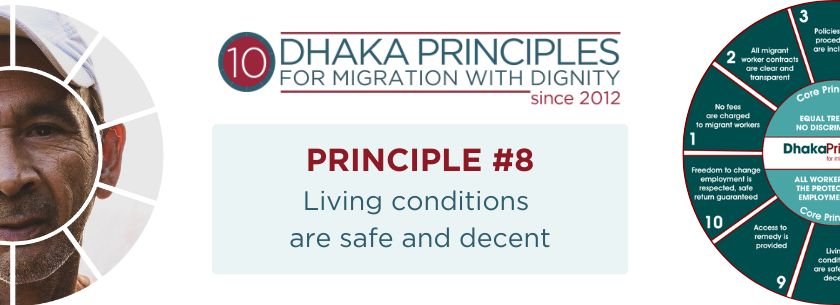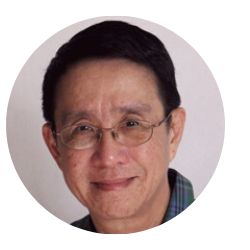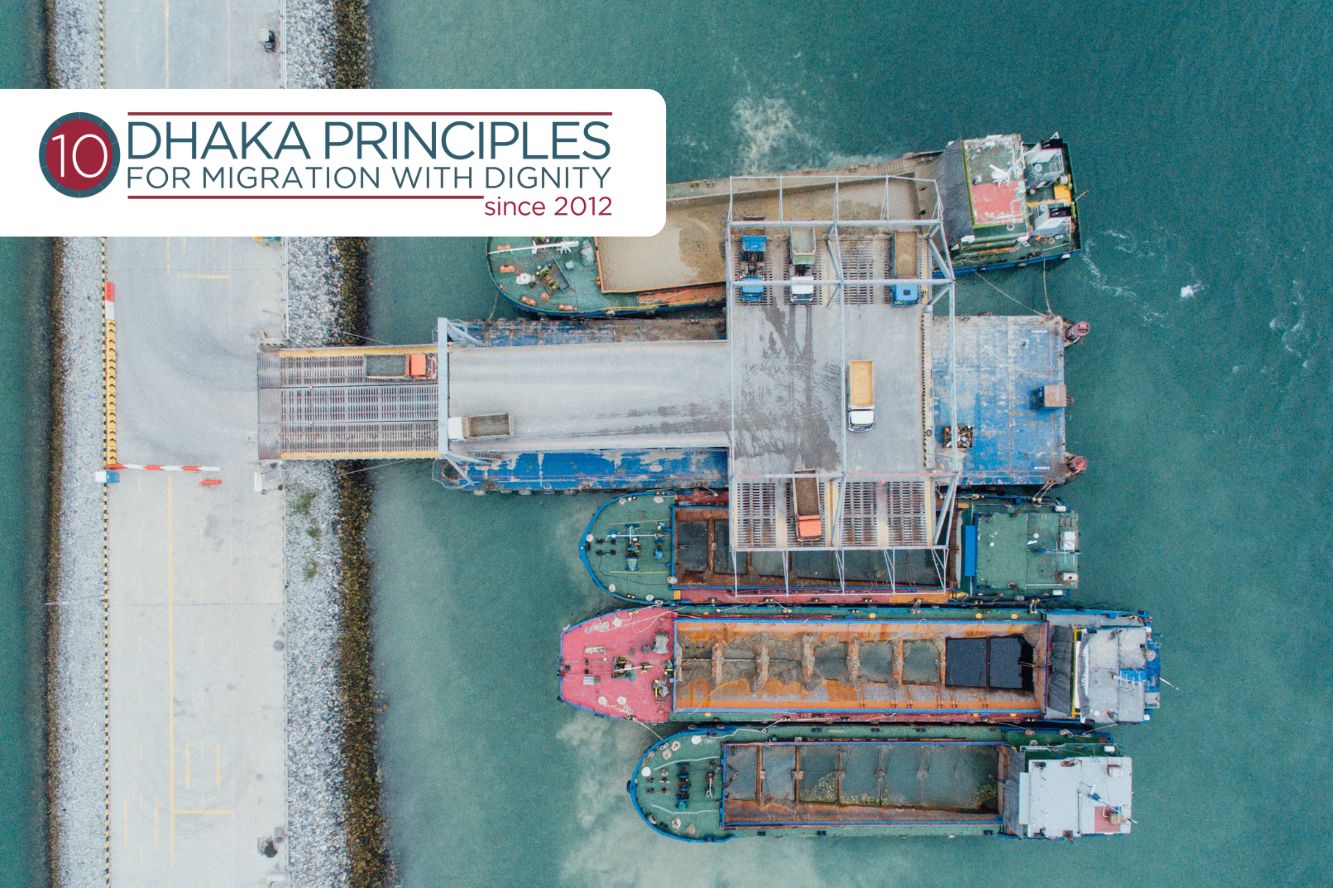Throughout 2022, IHRB is marking ten years of the Dhaka Principles for Migration with Dignity with guest commentaries from representatives of business, trade unions, civil society organisations, and the UN system that reflect on the continuing importance of each of the twelve individual Principles. These experts are exploring challenges relating to each Principle in turn and discussing how faster progress can be made.
Principle 8. Living conditions are safe and decent
Migrant workers should enjoy safe and hygienic living conditions, and safe transport between the workplace and their accommodation. Migrant workers should not be denied freedom of movement, or confined to their living quarters.
Our organisation, Transient Workers Count Too (TWC2), supports migrant workers in Singapore, and advocates for their rights in the workplace and in wider society. We’ve seen firsthand the many challenges migrant workers face concerning accommodation, conditions that are likely illustrative of situations found elsewhere in the world. The bottom line: all too often, worker housing is inadequate, and migrant workers frequently face a range of additional discriminatory practices that compromise their rights.
The Eighth Dhaka Principle on safe and decent working conditions was tested as never before during the Covid-19 pandemic. Over three weeks in April 2020, thousands of migrant workers living in mass dormitories were found to be Covid-positive, and all such dormitories were locked down, affecting about 320,000 men. In Singapore, the medium and large dormitories – which house as many as 25,000 residents -- are exclusively male, serving the construction and shipyard sectors. They would remain under restrictions for the next 26 months.
By December 2020, about half the migrant worker population in these dorms had been infected, some of them more than once. The number of infections continued to rise until vaccinations were aggressively rolled out to them in the second quarter of 2021.
The Eighth Dhaka Principle on safe and decent working conditions was tested as never before during the Covid-19 pandemic. Over three weeks in April 2020, thousands of migrant workers living in mass dormitories were found to be Covid-positive, and all such dormitories were locked down, affecting about 320,000 men
Yet, despite high levels of natural immunity and over 90 percent vaccinated by the third quarter of 2021, workers remained largely confined to their dorms. Taken by employers to worksites each day, workers had to return to barracks at the end of their shifts. They were not allowed to leave their dormitories for leisure until late 2021 (about 18 months after the lockdown began) and even then, were only permitted to go a few hundred metres to designated “recreation centres”, - small clusters of shops and cafes built to serve migrant communities. Permission from the government was required to go anywhere else. In many cases, employers had to apply for permission for workers, thereby making employers a supplementary gatekeeper.
Starting from mid 2021, NGOs and public health experts repeatedly pointed out that there was no longer any public health rationale for confinement, but policy remained unchanged for many more months. These restrictions were finally lifted in June 2022, some 26 months after the lockdown began. The official justification for the continuance of these measures long after monthly cases among dorm residents had fallen to single digits was that their dense housing posed the risk of a resurgence of uncontrolled spread.

In effect, saying that dense housing poses risks was an admission that such dormitories are unsafe places to house workers. Typically, each man is assigned a bed and perhaps three square metres of space to call his own. Pre-Covid, 16 or 20 men would commonly share a room (In 2021, the building codes were tightened slightly, a maximum of 12 persons per room). Beyond infection risks, such housing arrangements also raise concerns about privacy and personal security, and consequently, mental well-being.
Employers do not have to put their workers in such dormitories. They remain free to find alternative accommodation for them. Indeed, employers in the services and manufacturing sectors often place migrant workers in private apartments or allow them to find their own accommodation. These workers were not affected by the lockdowns of the mass dormitories; their movements were never restricted except very briefly at the height of the crisis.
In contrast, employers in the construction and shipyard sectors almost always place workers in mass dormitories. Besides competitive costs, the key driver for choosing to do this is the need to have workforces in the same location to facilitate transport to and from work.
Our organisation received reports of workers going without food for up to two days until alternative arrangements were set in motion.
Given this experience with mass dormitories, the question can be asked whether this type of accommodation is consistent with Principle 8. However, if the economic reality is that such dormitories cannot be wished away, what standards and codes of practice are needed for dormitory operators in order for them to respect rights?
Singapore’s experience raises questions that go far beyond the issues of health risks and movement control. Many other effects cascaded from the decision to lock down dormitories and deny workers freedom of movement.
The most immediate consequence was access to food. This became a crisis within hours of lockdown. In normal times, some workers received catered meals, while others cooked their own. Upon lockdown, often with only a few hours’ notice, preparation and delivery of catered meals (often undertaken by other migrant workers) were paralysed. Men who normally cooked their own meals suddenly found themselves unable to go to the shops to buy groceries. Our organisation received reports of workers going without food for up to two days until alternative arrangements were set in motion.
The government directed employers to provide meals to their employees confined to dorms. This proved to be difficult. Firstly, not having been responsible for catering before, employers had neither the contacts with food suppliers or the credit to discharge this responsibility. Secondly, with their businesses shut down due to the confinement of their workers, they didn’t have cashflow to do so either. This was only eased a few weeks later when the government gave tax levy rebates to employers to enable them to organise meals.
Over the following weeks and months, access to medical care became an issue. Whilst detection of Covid-19 infections and isolation of patients were carried out with ruthless efficiency, workers with other illnesses and injuries encountered numerous obstacles trying to get medical help. Pre-Covid, they could go to any clinic or hospital on their own, but with the lockdown permission was required and some employers turned out to be obstructive. Attempts at tele-consultations were made, but filling prescriptions proved another headache.
The situation facing migrant workers in Singapore during Covid illustrates why Principle 8 needs to be understood in broader terms. What constitutes safe, decent and hygienic living conditions?
Contact with the outside world required topping up mobile phone data plans. Pre-Covid, workers purchased top-up cards from local shops. Unable to leave their dorms, workers were at risk of losing their chief means of communication with family, friends and helplines.
In the end, it was mostly non-governmental organisations that stepped in to fill these gaps. NGOs provided meals until employers could get organised. Transient Workers Count Too helped workers get exit permission to see doctors and delivered medicines to them, and spent nearly a million dollars to top up workers’ phone accounts. We also delivered, at our cost, basic essentials such as toiletries, coffee mixes, electric fans and sandals.
The situation facing migrant workers in Singapore during Covid illustrates why Principle 8 needs to be understood in broader terms. What constitutes safe, decent and hygienic conditions? What are employers' responsibilities when an emergency situation arises and workers can no longer do the things that, ordinarily, they do for themselves, such as getting food, accessing healthcare and having the means to stay in contact with loved ones and the outside world?:
- IHRB Briefing on Migrant Worker Accommodation: A briefing that provides an overview of the human rights risks posed to migrant workers via the practices surrounding accommodation provision. It includes information and resources for businesses consistent with international minimum standards and humanitarian emergency standards, on issues such as personal space and privacy and related health and safety conditions of accommodation provided by employers.
- Checklist - Migrant Workers' Accommodations: This checklist, as part of IOM’s Migrant Worker Guidelines for Employers, outlines key requirements for employers to provide adequate, decent and gender-responsive living conditions for migrant workers in employer-owned or operated accommodation and standards for spacing at workers’ accommodation.
- ILO Recommendation No. 115 concerning Workers’ Housing sets out important guidance for employers providing accommodation.
Singapore’s experience also raises the question as to what employers’ responsibilities are when government demands become unreasonable. Processes mandated by governments in some cases make employers responsible for enforcement. What is an employer’s moral duty when asked to enforce the unreasonable?
Living up to the spirit of Principle 8 means employers have a responsibility to speak up and use their influence to roll back the kinds of unreasonable restrictions that migrant workers in Singapore suffered for 26 long months. More global efforts are needed to highlight and take action to address migrant worker accommodation as a critical dimension of healthy workforces. Protecting and advocating for safe and adequate accommodation is fundamental to ensuring migration with dignity.
What is an employer’s moral duty when asked to enforce the unreasonable?
Living up to the spirit of Principle 8 means employers have a responsibility to speak up and use their influence to roll back the kinds of unreasonable restrictions that migrant workers in Singapore suffered for 26 long
months.

This month's expert is Alex Au, Vice-President at TWC2.
After a career in the corporate sector, Alex AU joined TWC2 in 2011, and for many years served as Treasurer. His first involvement in civil society began some twenty years prior, when he was prominent in Singapore’s LGBT movement. He is also known in Singapore as a socio-political commentator and human rights activist, and has contributed chapters to various books on politics and society. At TWC2, Alex has special responsibility for a number of portfolios: communications, internal data and case management systems, and international relations.





























The perception of ‘value’ needs to change if the World Bank’s mission is to succeed
Last week we attended the Spring Meetings of the World Bank and International Monetary Fund (IMF) in Washington, D.C. The annual IMF-World Bank meetings bring together finance ministers and central bankers from all regions as a platform for official...
26 April 2024 | Commentary
Commentary by Vasuki Shastry, Author, ESG/Strategic Communications Expert; International Advisory Council, IHRB Haley St. Dennis, Head of Just Transitions, IHRB